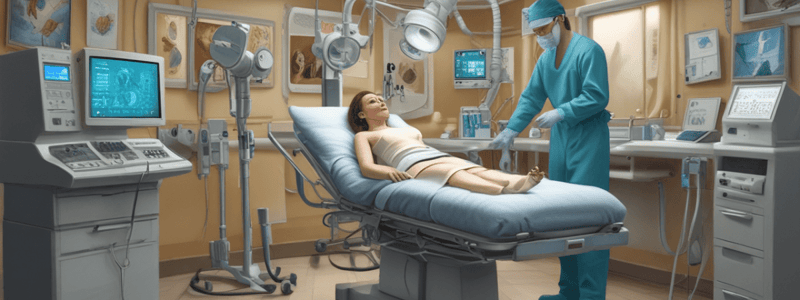Podcast
Questions and Answers
Which scenario primarily warrants the use of general anesthesia in pediatric patients?
Which scenario primarily warrants the use of general anesthesia in pediatric patients?
- The child's anxiety level is low.
- Local anesthesia is effective for small procedures.
- Attempts at local anesthesia or conscious sedation are unsuccessful. (correct)
- The child cooperates with local anesthesia.
Which of the following is NOT an indication for using general anesthesia in dental procedures?
Which of the following is NOT an indication for using general anesthesia in dental procedures?
- Successful completion of dental work with local anesthesia. (correct)
- Allergy to local anesthesia.
- Prolonged traumatic procedures.
- Severe trismus preventing local injection.
What type of anesthesia allows patients to be admitted and discharged the same day for short procedures?
What type of anesthesia allows patients to be admitted and discharged the same day for short procedures?
- Inpatient anesthesia.
- Office based anesthesia.
- Day care anesthesia. (correct)
- Sedation anesthesia.
What condition is a contraindication for safely injecting local anesthesia?
What condition is a contraindication for safely injecting local anesthesia?
Which phase of general anesthesia is characterized by the patient's loss of consciousness and reflexes?
Which phase of general anesthesia is characterized by the patient's loss of consciousness and reflexes?
What is one of the main purposes of using multiple drugs in the anaesthetic protocol?
What is one of the main purposes of using multiple drugs in the anaesthetic protocol?
During which phase of general anesthesia does the maintenance of unconsciousness primarily occur?
During which phase of general anesthesia does the maintenance of unconsciousness primarily occur?
What technique did Dr. William Morton demonstrate for dental practice in 1864?
What technique did Dr. William Morton demonstrate for dental practice in 1864?
Which of the following is NOT a safety protocol during anesthesia procedures?
Which of the following is NOT a safety protocol during anesthesia procedures?
What was a significant contribution by Dr. Horace Wells in 1844?
What was a significant contribution by Dr. Horace Wells in 1844?
What technique is primarily used for relaxation of skeletal muscles during general anesthesia?
What technique is primarily used for relaxation of skeletal muscles during general anesthesia?
What is the primary purpose of using neuromuscular blockers during the anesthesia process?
What is the primary purpose of using neuromuscular blockers during the anesthesia process?
Which anesthetic is commonly used for rapid induction of anesthesia in adults?
Which anesthetic is commonly used for rapid induction of anesthesia in adults?
Which phase of general anesthesia involves monitoring the patient closely until consciousness and protective reflexes are restored?
Which phase of general anesthesia involves monitoring the patient closely until consciousness and protective reflexes are restored?
What technique is typically employed for maintenance of general anesthesia?
What technique is typically employed for maintenance of general anesthesia?
What is the main objective of premedication before surgery in the anesthesia process?
What is the main objective of premedication before surgery in the anesthesia process?
What is the purpose of intubation during the induction phase of general anesthesia?
What is the purpose of intubation during the induction phase of general anesthesia?
Flashcards are hidden until you start studying
Study Notes
Phases of General Anesthesia
-
Before Surgery (Premedication):
- Anesthesiologist evaluates the patient prior to surgery.
- Anxiolytic medications may be prescribed alongside Metoclopramide to aid gastric evacuation.
-
During Surgery:
- Induction: Typically involves intravenous (IV) anesthetics like propofol or thiopental, inducing unconsciousness within 30-40 seconds.
- Neuromuscular Blocker (NMB): Agents such as rocuronium or succinylcholine are administered to facilitate tracheal intubation and muscle relaxation.
- Maintenance: Inhalational anesthetics are used to sustain anesthesia, allowing control over depth.
-
After Surgery (Recovery):
- The patient is monitored in a recovery room until consciousness and protective reflexes are restored, ensuring stable respiration and circulation.
Steps of General Anesthesia
- IV-Induction: Common agent propofol used for rapid unconsciousness.
- Inhalational Induction: An alternative method where inhaled gases are used for induction.
- Maintaining Anesthesia: Utilizes both volatile anesthetics and additional IV drugs to achieve effective anesthesia depth.
Clinical Principles
- General anesthesia employs a combination of medications including IV anesthetics for induction, inhalational agents for maintenance, sedatives, opioids (analgesics), and neuromuscular blockers to reduce risks associated with single-agent use.
Key Functions of General Anesthesia
- Provides analgesia, lack of awareness, amnesia, skeletal muscle relaxation, suppression of undesirable reflexes, sedation, and anxiolysis.
Historical Context
- Hanaoka Seishu (1804): First documented use of general anesthesia during a partial mastectomy in Japan.
- Dr. Horace Wells (1844): Pioneer of modern surgical anesthesia; introduced nitrous oxide ("laughing gas") for pain control during procedures.
- Dr. William Morton (1864): Credited with first successful use of ether in surgery during jaw tumor removal, establishing anesthetics in dental practice.
Indications for General Anesthesia in Dentistry
- Mentally challenged patients where local anesthesia is inadequate.
- Children uncooperative with local anesthesia; necessitating general anesthesia for dental procedures.
- Patients with allergies to local anesthetics or requiring prolonged surgeries.
- Severe situations like trismus preventing safe local anesthesia injection.
Administration Settings for General Anesthesia in Dentistry
- Dental chair anesthesia: Office-based, outpatient procedures.
- Day care anesthesia: For surgeries lasting less than one hour, allowing same-day discharge.
- Inpatient anesthesia: Required for extensive dental surgical procedures.
Studying That Suits You
Use AI to generate personalized quizzes and flashcards to suit your learning preferences.




